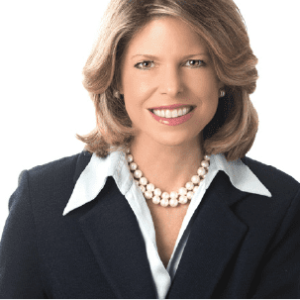 Throughout history, women have been change agents. Anna Bissell, America’s first female CEO; Katherine Johnson, who helped shape NASA’s mission to the moon; and Rosa Parks were just a few drivers of change. They were the first to stand up and stand out.
Throughout history, women have been change agents. Anna Bissell, America’s first female CEO; Katherine Johnson, who helped shape NASA’s mission to the moon; and Rosa Parks were just a few drivers of change. They were the first to stand up and stand out.
As women stride into the 21st century, who will lead and how will they lead? Women are creating real change and there’s no doubt that they will impact the future economy in a significant way.
When asked, 60% from GenZ say they want to personally drive world change. When asked what would improve their confidence the most, GenZ women say it would be improving their public speaking.
Women have risen above the fight to be simply be “allowed” and today, there’s a new level of momentum, driven by a convergence of women feeling empowered. Women are finding their voices, taking risks and driving some of our most innovative companies, such as 23andME and NextDoor.
With the celebration of International Women’s Day on March 9, Women With Impact asked leading women to share their views about where and how women will be impacted and create change over the next decade.

The pay parity between men and women across sectors and industries will be greatly narrowed. Recently, laws that prohibit employers from asking for previous compensation, along with an increase in pressure for U.S. companies to follow the United Kingdom in being more transparent on diversity and pay parity, are already making a difference for women. When employees are hired, especially at the junior level, they will all get paid equally, regardless of what they made before. Ultimately, the gap in pay — currently with women making about 76 cents for every $1 earned by men — will fall by the wayside.
Closing the gap could have meaningful impact on children and families given that 80% of single-parent families are headed by single mothers and nearly a third of those families live in poverty. Improving the financial opportunities for women through diversity and pay will benefit our broader economy and the communities we live in.

For the first time in history, women hold more than 40% of the world’s wealth. That power can make a huge impact in philanthropy, a sector, like business or technology, long dominated by men. Women like Priscilla Chan of the Chan Zuckerberg Initiative, Laurene Powell Jobs of Emerson Collective, Laura Arnold of Arnold Ventures, and Tricia Raikes of the Raikes Foundation are using their privilege and networks to create new, innovative approaches to our most intractable problems and to bring more attention, as well as funding, to truly effective organizations that need support to scale.
Women are also driving powerful resources in uniquely collaborative ways. Women’s funds — collective giving groups — supported $1.2 billion in giving last year. Women leaders are not waiting for traditional philanthropy; they are breaking new ground. Today, half of boomer nonprofits are led by women and 75% of millennial nonprofits are led by women. In the United States, women make up 75% of the nonprofit workforce, which translates to roughly 9.2 million women.
These women are mobilizing new resources, like Fatima Goss Graves and Sharyn Tejani, who head the National Women’s Law Center and Time’s Up Legal Defense Fund. They have raised $22 million in two short years while building a corps of 800 lawyers to support women who have experienced sexual harassment. Ai-Jen Poo, who is the co-founder and executive director of the National Domestic Workers Alliance, has also partnered with Cecile Richards to create SuperMajority, which provides women with tools to mobilize and advocate for issues most important to them.
Women understand the complexity of the challenges they face, so they work together, they collaborate, they co-create and do whatever is necessary to get the job done.

As women’s confidence increases, women will acquire greater stakes in companies they are helping to build. This speaks volumes, not only for building their wealth, but for having the financial ability to invest in others.
A good example would be women’s health, which receives just 4% of research dollars and is woefully underfunded. Women’s health issues are different from men. Diseases like Alzheimer’s and heart disease present differently in women. That’s why National Tech Labs was started and the women that work there are geeks; they understand they can have a real impact on this industry.

The number of women of color in key front office position in sports will jump over the next decade. She has been tracking the progress of women of color for 20 years and one interesting trend has been the shift of women in human resources and customer service areas. As these women come into their 50s, they have amassed a skillset in talent management, acquisitions and customer experiences. Cynthia Marshall, the new CEO of the Dallas Mavericks and the first African American to lead an NBA team, Davis, and others are coming through the pipeline in many major sports. Women of color in some of the traditional industries — financial services, consumer goods and even tech — will make their way into the sports arena. There will be a normalizing of this idea of work/family balance not being a big deal. It will just be the way companies operate in only three to five years.
 The great Mae West once noted, “Good girls go to heaven, bad girls go everywhere.” Surely we want girls and women to be cosmopolitan, worldly, in the best sense of the word.
The great Mae West once noted, “Good girls go to heaven, bad girls go everywhere.” Surely we want girls and women to be cosmopolitan, worldly, in the best sense of the word.
College binge drinking has become a ritual that many students see as part of their higher education experience. With more young women viewing college binge drinking as empowering — as a means of throwing off ‘good girl’ stereotypes — we should anticipate more transgressive behaviors among them on college campuses as we do with young men. Binge drinking, for example, is correlated to greater numbers of women being victims of violence. Jails, more typically populated by men in our population, have in the last few decades begun to see a marked increase in the number of women incarcerated. And sexual misconduct cases on college campus are more often than not associated with excessive consumption of alcohol, which should not be understood in any way as ‘blaming the victim.’ Alcohol, while no longer acceptable as an excuse for misconduct, renders the question of consent much murkier.
We can take steps now to help avert a crisis by recognizing there’s a vulnerability; how do we teach all students to see through the specious marketing schemes targeting women and marginalized groups that simplistically equate transgression with a state of empowerment?
 Steve Jobs wore the same thing every day: warm socks, casual pants, and a black turtleneck. He was connected to the earth and his power. So, why are women spending so much time worrying about how they look? As women seek to optimize their power, they will shift their mindset to keeping their attire simple, enabling them to focus on the job at hand.
Steve Jobs wore the same thing every day: warm socks, casual pants, and a black turtleneck. He was connected to the earth and his power. So, why are women spending so much time worrying about how they look? As women seek to optimize their power, they will shift their mindset to keeping their attire simple, enabling them to focus on the job at hand.
As a result, women like Warson are beginning to seek out those comfort shoes in an effort to focus their time on energy on things that really matter. The fashion industry will, as a result, wake up and pivot to designing clothing that celebrates the feminine and bolsters women in the power. The designs of Nina McLemore are one example: strong bold colors without low cuts or the frivolous that can distract. Simple, clean-cut office uniforms are in vogue. This will translate into other areas like purses; women will learn to simplify rather than lugging five pounds of stuff, and designers will follow suit.
 While the number of women CEOs won’t double among public companies, there likely will be a doubling in the number of women on corporate boards. Both companies and investors are realizing the importance of having a diverse set of views — not just inside the company but as outside advisors. While the presence of women on public boards is not mandated in the United States as it is in the United Kingdom, California recently mandated that all public companies with their executive base in the state must currently have at least one woman on their board. Goldman Sachs was among the latest to fall behind, saying it will not take a company public without a woman on its board. CEO David Solomon said that over the past four years, initial public offerings of companies in the United States with at least one female director on their boards performed significantly better compared to those without. Goldman’s goal is to see two women on those boards by 2021.
While the number of women CEOs won’t double among public companies, there likely will be a doubling in the number of women on corporate boards. Both companies and investors are realizing the importance of having a diverse set of views — not just inside the company but as outside advisors. While the presence of women on public boards is not mandated in the United States as it is in the United Kingdom, California recently mandated that all public companies with their executive base in the state must currently have at least one woman on their board. Goldman Sachs was among the latest to fall behind, saying it will not take a company public without a woman on its board. CEO David Solomon said that over the past four years, initial public offerings of companies in the United States with at least one female director on their boards performed significantly better compared to those without. Goldman’s goal is to see two women on those boards by 2021.
Gretchen Carlson, journalist and founder of LiftOurVoices
 With the momentum behind safe workplaces and equal pay, companies like Wells Fargo are moving to eradicate arbitration clauses in employment contracts for sexual harassment cases in all American business. In fact, Wells Fargo was the first among the largest of the U.S. banks to make the announcement. Also falling by the wayside will be non-disclosure agreements. Conde Nast, publisher of the New Yorker, GQ and Vogue, just announced it will end the use of NDAs across the company. The move came as its own staff reported on the Harvey Weinstein case and the impact of NDAs in silencing women. And just last month, the House voted 67-0 to pass HB21, a bill that would prevent employers from forcing NDAs on employees who are setting over discrimination, harassment or retaliation.
With the momentum behind safe workplaces and equal pay, companies like Wells Fargo are moving to eradicate arbitration clauses in employment contracts for sexual harassment cases in all American business. In fact, Wells Fargo was the first among the largest of the U.S. banks to make the announcement. Also falling by the wayside will be non-disclosure agreements. Conde Nast, publisher of the New Yorker, GQ and Vogue, just announced it will end the use of NDAs across the company. The move came as its own staff reported on the Harvey Weinstein case and the impact of NDAs in silencing women. And just last month, the House voted 67-0 to pass HB21, a bill that would prevent employers from forcing NDAs on employees who are setting over discrimination, harassment or retaliation.
 In my role as a commissioner on the San Francisco Commission on the Status Women, I have come across a lot of information that has forever changed my outlook on life. For example, 1 in 4 women have been the victim of severe physical violence by an intimate partner in their lifetime. And, according to the National Network to End Domestic Violence, financial abuse occurs in 99% of domestic abuse cases. Financial abuse can take many forms ranging from forbidding the victim to work, to controlling all of the money and paying the victim an allowance, to running up large debts on joint accounts, to outright theft. For abusers, money is power.
In my role as a commissioner on the San Francisco Commission on the Status Women, I have come across a lot of information that has forever changed my outlook on life. For example, 1 in 4 women have been the victim of severe physical violence by an intimate partner in their lifetime. And, according to the National Network to End Domestic Violence, financial abuse occurs in 99% of domestic abuse cases. Financial abuse can take many forms ranging from forbidding the victim to work, to controlling all of the money and paying the victim an allowance, to running up large debts on joint accounts, to outright theft. For abusers, money is power.
If you strip your partner of access to money, you also strip them of their ability to care for themselves or make decisions in their own best interests. It is often difficult for victims to leave an abusive relationship — they can become dependent on the perpetrator, they can lack the resources, knowledge, and confidence to break the cycle. Schwab believes that in the next decade financial literacy will become a powerful tool in helping women leave abusive relationships. While financial literacy isn’t a cure for such a potentially devastating and complicated array of crimes, it does represent a powerful tool in self-protection, and a path to a better future.
Beth Comstock, former Vice Chair at GE, Nike board member, and Author
 More women are finding and using their voice as a force for change. The trend is gaining momentum, transcending politics and making its way into healthcare and corporate governance. The movement will have a tremendous influence on corporate cultures, causing them to re-think both the issues and opportunities. For instance, women in the workplace will want help in finding their voice, communicating effectively, and harnessing that voice for positive change. We’ve seen it in sports, politics and business. Women’s voices will now finally play a greater role in areas dominated by men For companies, the question is: how will they invest in women? How will they tap into this groundswell of momentum and desire to find their voices? Whether you’re on the PTA or a corporate leader wanting to address a need, you can start small, leverage the power of social media, test a message, and find voice to it.
More women are finding and using their voice as a force for change. The trend is gaining momentum, transcending politics and making its way into healthcare and corporate governance. The movement will have a tremendous influence on corporate cultures, causing them to re-think both the issues and opportunities. For instance, women in the workplace will want help in finding their voice, communicating effectively, and harnessing that voice for positive change. We’ve seen it in sports, politics and business. Women’s voices will now finally play a greater role in areas dominated by men For companies, the question is: how will they invest in women? How will they tap into this groundswell of momentum and desire to find their voices? Whether you’re on the PTA or a corporate leader wanting to address a need, you can start small, leverage the power of social media, test a message, and find voice to it.

Chief Executive Group exists to improve the performance of U.S. CEOs, senior executives and public-company directors, helping you grow your companies, build your communities and strengthen society. Learn more at chiefexecutivegroup.com.
0

1:00 - 5:00 pm
Over 70% of Executives Surveyed Agree: Many Strategic Planning Efforts Lack Systematic Approach Tips for Enhancing Your Strategic Planning Process
Executives expressed frustration with their current strategic planning process. Issues include:
Steve Rutan and Denise Harrison have put together an afternoon workshop that will provide the tools you need to address these concerns. They have worked with hundreds of executives to develop a systematic approach that will enable your team to make better decisions during strategic planning. Steve and Denise will walk you through exercises for prioritizing your lists and steps that will reset and reinvigorate your process. This will be a hands-on workshop that will enable you to think about your business as you use the tools that are being presented. If you are ready for a Strategic Planning tune-up, select this workshop in your registration form. The additional fee of $695 will be added to your total.

2:00 - 5:00 pm
Female leaders face the same issues all leaders do, but they often face additional challenges too. In this peer session, we will facilitate a discussion of best practices and how to overcome common barriers to help women leaders be more effective within and outside their organizations.
Limited space available.

10:30 - 5:00 pm
General’s Retreat at Hermitage Golf Course
Sponsored by UBS
General’s Retreat, built in 1986 with architect Gary Roger Baird, has been voted the “Best Golf Course in Nashville” and is a “must play” when visiting the Nashville, Tennessee area. With the beautiful setting along the Cumberland River, golfers of all capabilities will thoroughly enjoy the golf, scenery and hospitality.
The golf outing fee includes transportation to and from the hotel, greens/cart fees, use of practice facilities, and boxed lunch. The bus will leave the hotel at 10:30 am for a noon shotgun start and return to the hotel after the cocktail reception following the completion of the round.